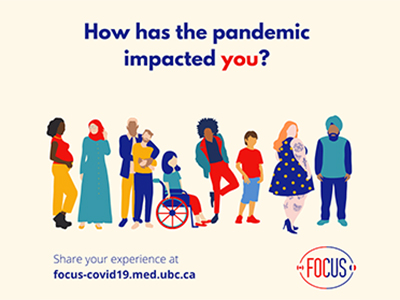
The FOCUS survey is looking for input from youth to inform outreach and mental health supports during the pandemic.
Hearing from youth about how the COVID-19 pandemic is impacting them is a central goal of the FOCUS study. Led by Vancouver Coastal Health Research Institute researcher Dr. Rod Knight and Dr. Pierre-julien Coulaud, the study asks youth between the ages of 18 and 29 to fill out a 20-minute online survey to share their thoughts on such things as COVID-19 policies, how they are coping during the pandemic and what supports they need.
“We will be working in real-time with policymakers to describe our preliminary findings around, for example, youth mental health and how that is associated with self-isolation and public health directives,” says Knight.

Launched in October 2020, the first phase of the survey, which concludes in December 2020, has already amassed over 2,500 responses. Around half of the respondents have also agreed to participate in a FOCUS study follow-up survey scheduled for spring 2021.

This second survey will enable researchers to track whether youth are doing better or worse over time.
“Young people know more than anyone else what they are really experiencing, which is why it is important to gather information to document how the pandemic is impacting youth and which health interventions are most effective,” says Coulaud.
“Our statistical analysis will generate important data about the psychological well-being of youth, including a potential curve that could demonstrate how youth in Canada are faring after the first and second waves of the pandemic.”
Preliminary findings will be shared in 2021 in a series of community reports, says Knight.
An international effort to better support youth during the pandemic
Knight and Coulaud are collaborating with researchers in Quebec for the French translation of the Canadian survey, as well as researchers in France who are conducting their own national survey, led by sociologist Dr. Marie Jauffret-Roustide.
“We know that public health directives for COVID-19 are geographically diverse,” says Knight. “Looking at different regions within Canada and abroad will help us identify such things as how one type of lockdown is associated with certain symptoms, such as depression and substance use.”
An Ontario-based study by the Centre for Addiction and Mental Health found that 39 per cent of the 600 youth who responded to a virtual survey were struggling with their mood and anxiety. Among youth who had previously accessed mental health supports, 50 per cent reported challenges with getting the care they needed1.

Vulnerable youth, such as transgender, low-income and other traditionally marginalized individuals, may be facing even greater challenges during the pandemic because of the sometimes precarious nature of their social supports and housing situations.
The temporary closure of many facilities or programs, which has occurred to prevent the spread of the COVID-19 virus, has also made it challenging for the “lockdown generation” to access the supports they need.
“Digital care services are coming online, but making those services readily available and accessible to youth often takes time, resources and evidence to actualize.”
On top of this, mainstream media messages have characterized youth as disproportionately ignoring public health recommendations, says Coulaud. While there is little evidence to support this, additional research is needed to help set the record straight.

“Recent data shows that youth are deeply concerned about the health of their families and grandparents, even more than their own health, while they try to cope with the pressures of academic studies and jobs,” says Coulaud. “This has put a lot of strain on youth, and research shows it is affecting their sleep and mental health.”
“With the FOCUS study, we will be able to add more youth voices to discussions about public health measures, and hopefully inform policies that can help youth weather the pandemic storm.”


